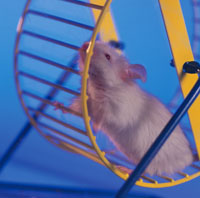Will a Dose of Irisin Help You Lose Weight?
It’s fair to say that almost all men and women who’ve ever struggled with their weight have dreamed of this: a magic chemical that turns fat into calorie-burning superfat.
Such is the essential gist of the week’s most touted piece of health news, which comes courtesy of a new Nature publication by a team of researcher from across the globe, led by Dana Farber. The chemical in question is called ‘irisin‘ — a hormone that comes out of a larger protein that your body makes when you exercise. Irisin’s basic purpose in life, as it appears right now, is to turn useless clumps of white fat cells — the fat we all know and love on our thighs, waist, and butt — and transform it into oxygen-consuming, fuel-burning brown fat. Inject irisin into white fat cells in a dish, and it turns them to brown fat; give mice a genetic superdose of the stuff, and they stay leaner and healthier through old age than their control peers, even if you feed them a terrible diet. And since it looks pretty much exactly in humans as in mice … well, let’s just say, a lot of gym-haters’ prayers have been answered.
But here’s the catch — it’s not going to be that simple, and you know it. For one thing, if you read through the news articles covering this, it’s clear that the mechanism as it stands right now makes no sense. Evolutionarily speaking, motion-induced energy waste is a really bad thing for a guy to have when he has to chase down a lion for his dinner. For another thing, everybody knows far too well how hard it is to lose a ton of weight with exercise alone — if exercise-induced brown fat were all there were to our energy balance story, it wouldn’t be nearly so hard. There are other systems at play here.
Way more often than not, there’s a big fat catch to everything that sounds too good to be true. Anyone remember the excitement about ghrelin, the hunger hormone? What about leptin, the mighty weight squasher? And more recently, the endocannabinoids that wound up causing depression? As icing on the cake, I want to point you all to this piece in the latest Wired that does a pretty awesome job of explaining why, even when scientists know way more about a given biological system than they do about this new one here, chemicals and drugs and hopes and dreams can still go very, very wrong. So everyone, just simmer on down and wait for the other shoe to drop, because odds are, it will.
(And if it doesn’t, that would be amazing and wonderful and I’ll be right there with you in line to get my first dose of brown fat superdrug, too.)
Extra reading: New Scientist | New York Times | Nature



